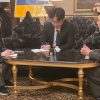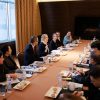New Europe Center team has made and is making efforts to achieve the most effective security model for Ukraine – full accession to NATO.
These are recent key analytical materials reflecting the efforts:
- An analytical material with infographic “Security matrix of Ukraine. From commitments to guarantees“
- An analytical memo “Potential formats and requirements for inviting Ukraine to NATO“
- An infographic document “Security guarantees and complementary elements: algorithm of application“
- An analitycal analysis of a sociological opinion poll titled “Foreign policy and security. Opinions of Ukrainian Society“
- An analytical commentary on Carnegie Endowment Europe “Taking the Pulse: Would Freezing Ukraine’s NATO Membership Process Advance Peace?“
On the eve of the Washigton NATO summit (July 8-9, 2024), the New Europe Center had conducted an active advocacy campaign aimed at Ukraine’s swift invitation to join the Alliance.
As part of this campaign, the New Europe Center has prepared the following analytical materials:
- An analysis of preparatory efforts for the anniversary summit in the context of Ukraine “Biden’s summit. Why Ukraine will not be invited to NATO, and America is still afraids of Putin“;
- An infographics “Why is Ukraine’s NATO membership also in America’s interests?“;
- An infographics “Why is Ukraine’s NATO membership in Europe’s interests?“;
- An analytical material on Atlantic Council “The view from Kyiv: Why Ukrainian NATO membership is in US interests“;
- A joint with ТСН.ua survey of experts on the eve of the NATO summit “Without high expectations“;
- A discussion paper “Security Formula ‘NATO Plus’“
On the eve of the NATO Summit in Vilnius (July 11-12, 2023), the New Europe Center launched an active advocacy campaign aimed at Ukraine’s swift invitation to join the Alliance.
As part of this campaign, the New Europe Center has prepared analytical materials:
- An analysis of a sociological survey titled “Public opinion in Germany, France, Italy, the Netherlands, and the USA. How do these countries support Ukraine and its NATO aspirations?“;
- An analytical memo titled “Why should Ukraine be invited to join NATO?“.
- An article in the New York Times “A NATO Invitation Will Make or Break Ukraine”.
- An analytical article in Politico EU “Why Ukraine should get an invitation to NATO”;
- A report in SCEEUS “No Longer a Mésalliance: How Well Prepared Are NATO and Ukraine for Each Other?”
- An article in ECFR “On the outside looking in: Why NATO should invite Ukraine to join the alliance at the Vilnius summit”
- An analytical article in Ukraine verstehen “Ukraine: invitation to NATO membership and state of reforms”
- An analytical article in Le Rubicon “Ukraine and NATO: how to correct the “Bucharest error” at the Vilnius summit”
- An analysis of a sociological survey titled “Public opinion in Germany, France, Italy, theNetherlands, and the USA. How do these countries support Ukraine and its NATO aspirations?“;
- An infographic “Ukraine adopts NATO standards despite the Big War”;
- An infographic “Accession process in NATO”.
Analysis of a sociological survey
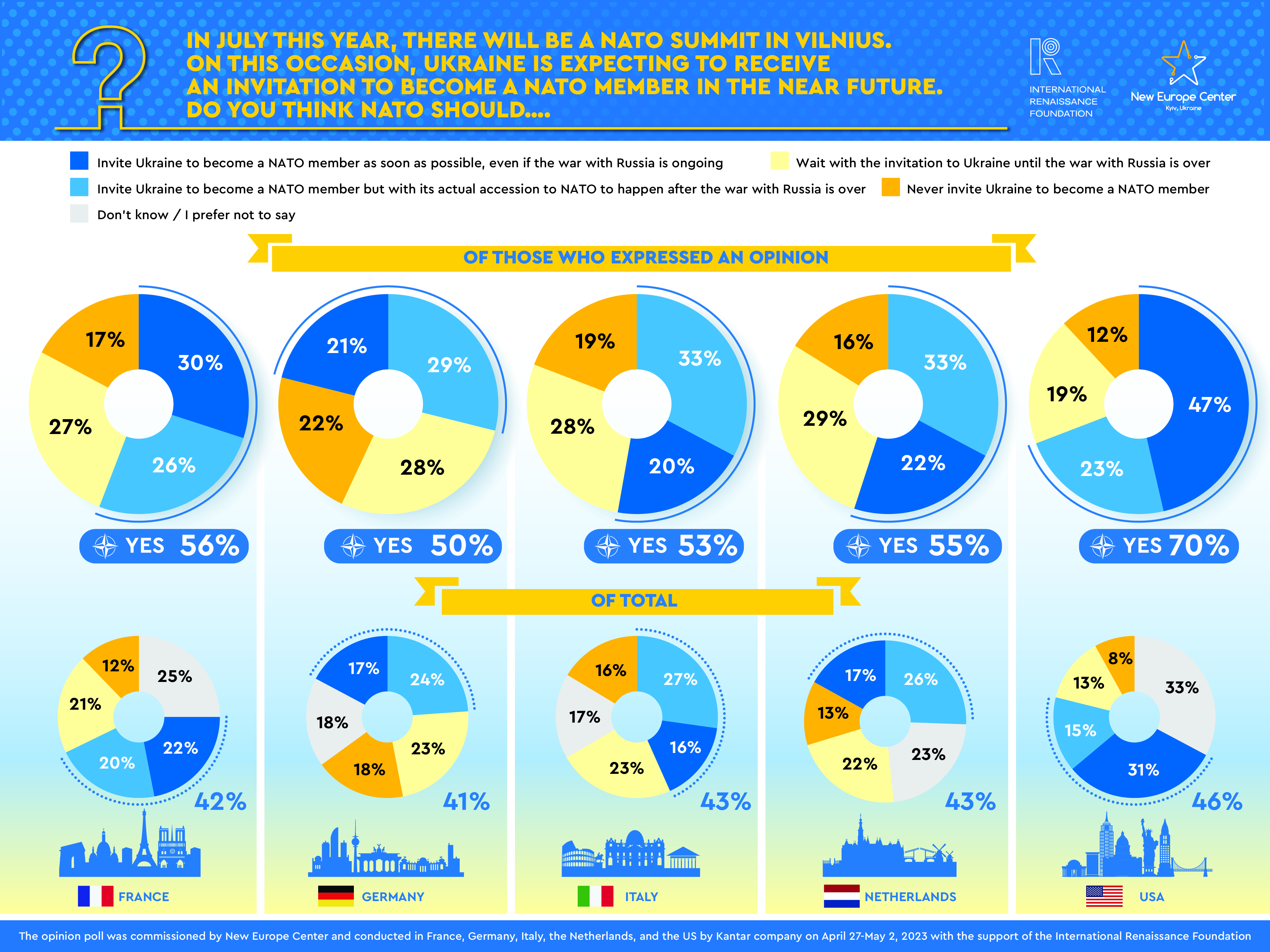
The New Europe Center presents opinion poll in five countries – France, Germany, Italy, the Netherlands, and the USA. It was conducted by Kantar company at the request of our think tank on April 27 – May 2 2023.
Key conclusions:
- Support of Ukraine. The majority of respondents in all surveyed countries (who have made up their minds) support the option that Ukraine should regain control over all territories, including Crimea. The ranking is led by France with 64%, the Netherlands with 58%, Germany with 52%, the US with 52%, and Italy with 50%.
- Restored peace. The most preferred option for lasting peace is the regime change in Russia, which tops the preferences in all the surveyed countries, although to a different degree. The second most preferred option among all countries is the defeat of Russia on the battlefield and then the membership of Ukraine in NATO.
- NATO aspirations. In all the 5 survey countries there is support for Ukraine’s starting its accession process. If one considers the two options: “invite Ukraine to become a NATO member as soon as possible, even if the war with Russia is ongoing” and “invite Ukraine to become a NATO member but with its actual accession to NATO to happen after the war with Russia is over”, we could see the support of the majority in all surveyed countries. The two options combined varies in EU-surveyed countries from 50% to 56%, while in the US this option is preferred by 70% of respondents who made up their mind.
The full results of the opinion poll and key infographics can be found at the provided link.
Analytical Memo
On May 30, 2023, the New Europe Center released a series of infographics presenting arguments as to why Ukraine should receive an invitation to join NATO as soon as possible.
NATO member states have maintained the position since the 2008 Bucharest Summit that Ukraine will one day become a member of the Alliance. However, in practice, NATO continues to implement a policy of «strategic ambiguity». Would Putin have dared to attack Ukraine if it had been a NATO member? This is extremely unlikely. NATO should correct the tragic mistake made in Bucharest and invite Ukraine to join the Alliance.
Our arguments for why Ukraine should be invited to NATO are as follows:
- Inviting Ukraine to join NATO would accelerate the end of the war.
- There is no need to fear escalation because Putin himself has no stomach for a confrontation with NATO.
- There are no restrictions on inviting new members during wartime.
- An invitation to join NATO does not mean immediate accession.
- Ukraine has already achieved a completely new level of interoperability with NATO.
- Ukraine has proven that it can become a pillar of NATO’s eastern flank.
- Public opinion in NATO member states backs Ukrainian membership.
- NATO membership unites Ukrainians.
- Joining NATO will boost Ukrainian morale and demoralize the Russian army.
- Inviting Ukraine to join NATO sends a signal to investors.
- Joining NATO is a powerful signal to millions of Ukrainian refugees.
- EU membership helps drive reforms but cannot provide security.
You can access the full text of the corresponding memo at this link.
All three sets of infographics with their respective arguments can also be found on our website:
A NATO Invitation Will Make or Break Ukraine
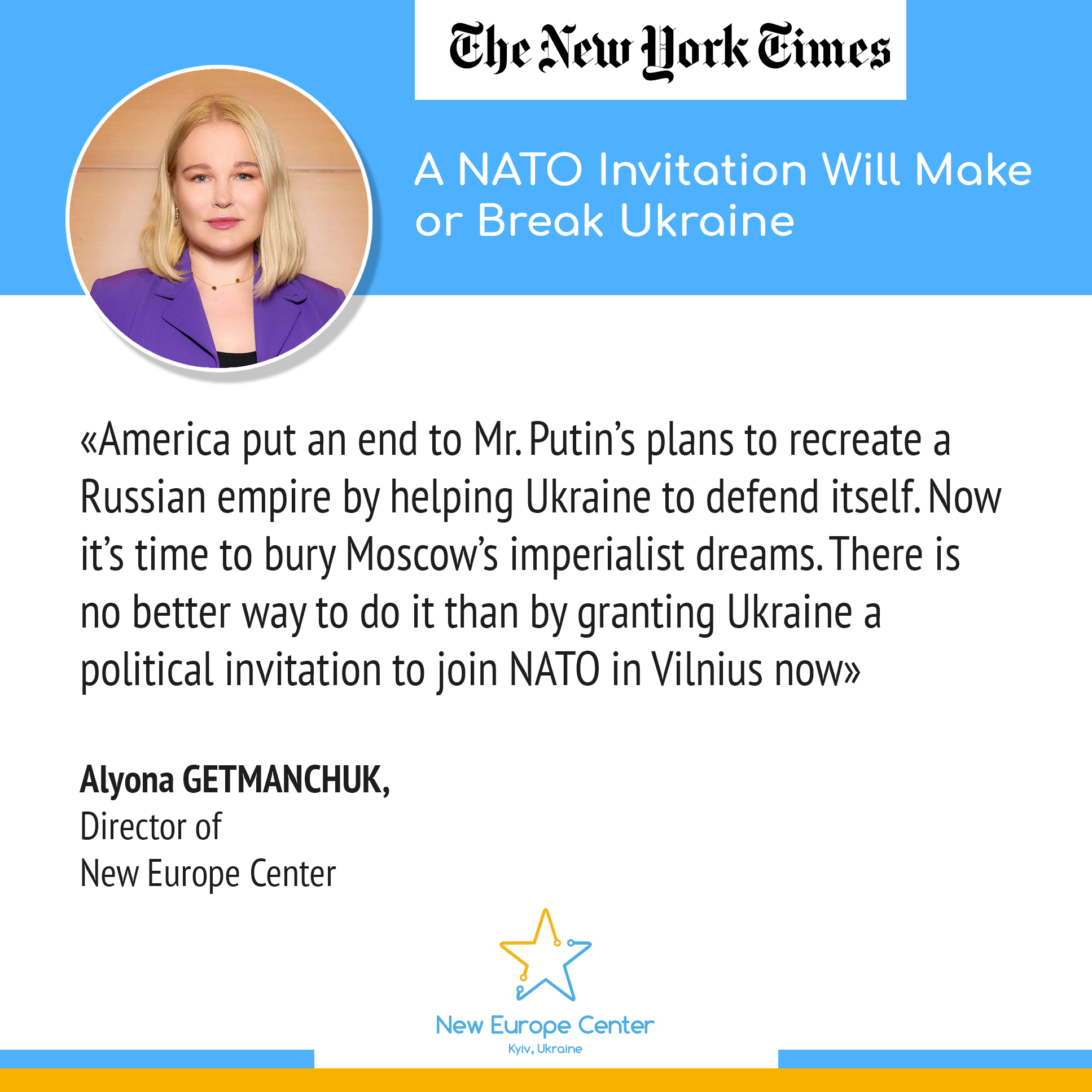
Alyona Getmanchuk, Director of the New Europe Center, in her column for the New York Times persuades and explains why it is the best time to invite Ukraine to NATO. And what consequences the world would have in case of non-invitation.
Full Alyona Getmanchuk`s opinion is here: https://tinyurl.com/ymtx2ts3
Why Ukraine should get an invitation to NATO
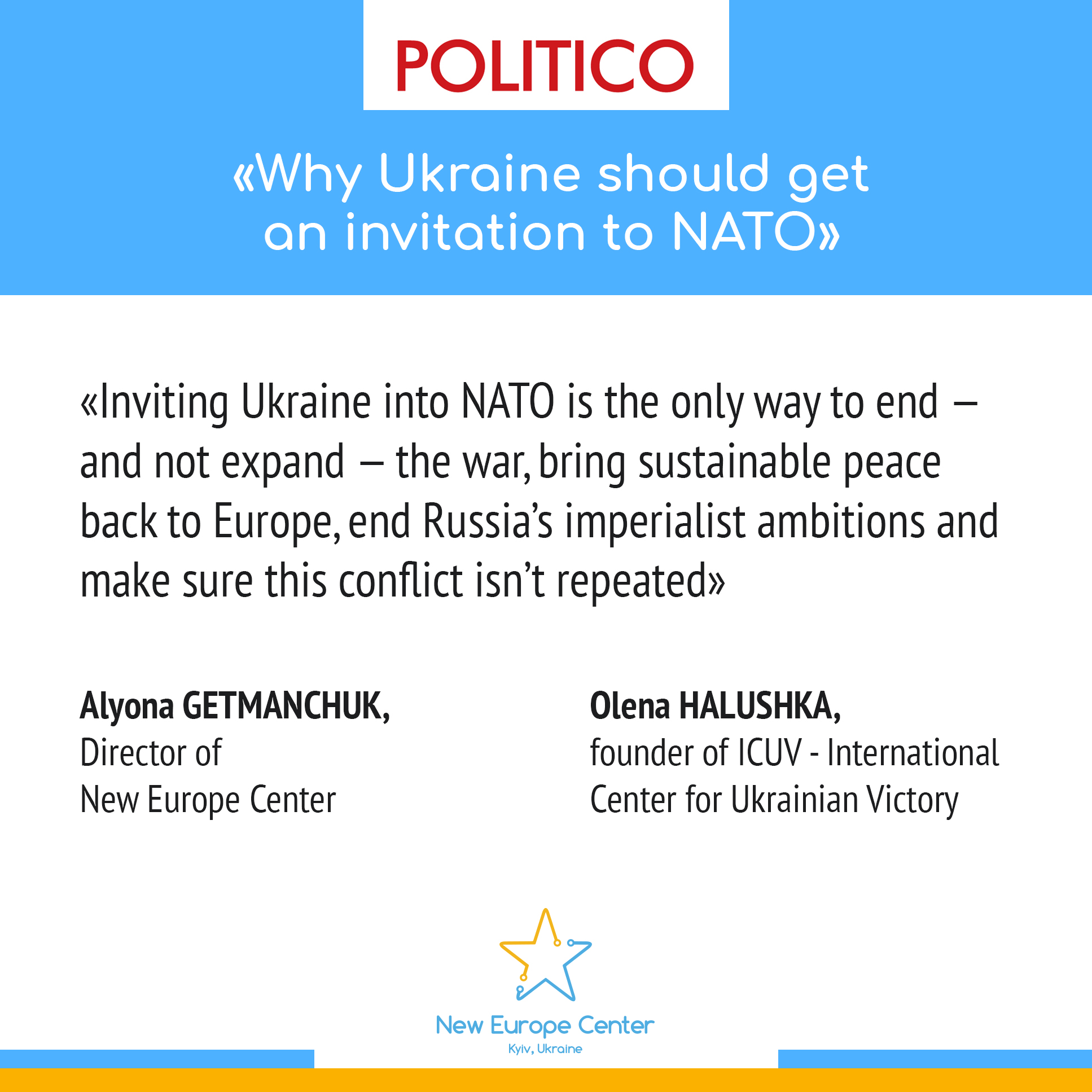
Alyona Getmanchuk, Director of New Europe Center and Olena Halushka, the co-founder of the International Center for Ukrainian Victory, wrote an article to Politico about Ukraine`s invitation to NATO.
The original article is on Politico: https://www.politico.eu/article/why-ukraine-should-get-an-invitation-to-nato/
No Longer a Mésalliance: How Well Prepared Are NATO and Ukraine for Each Other?
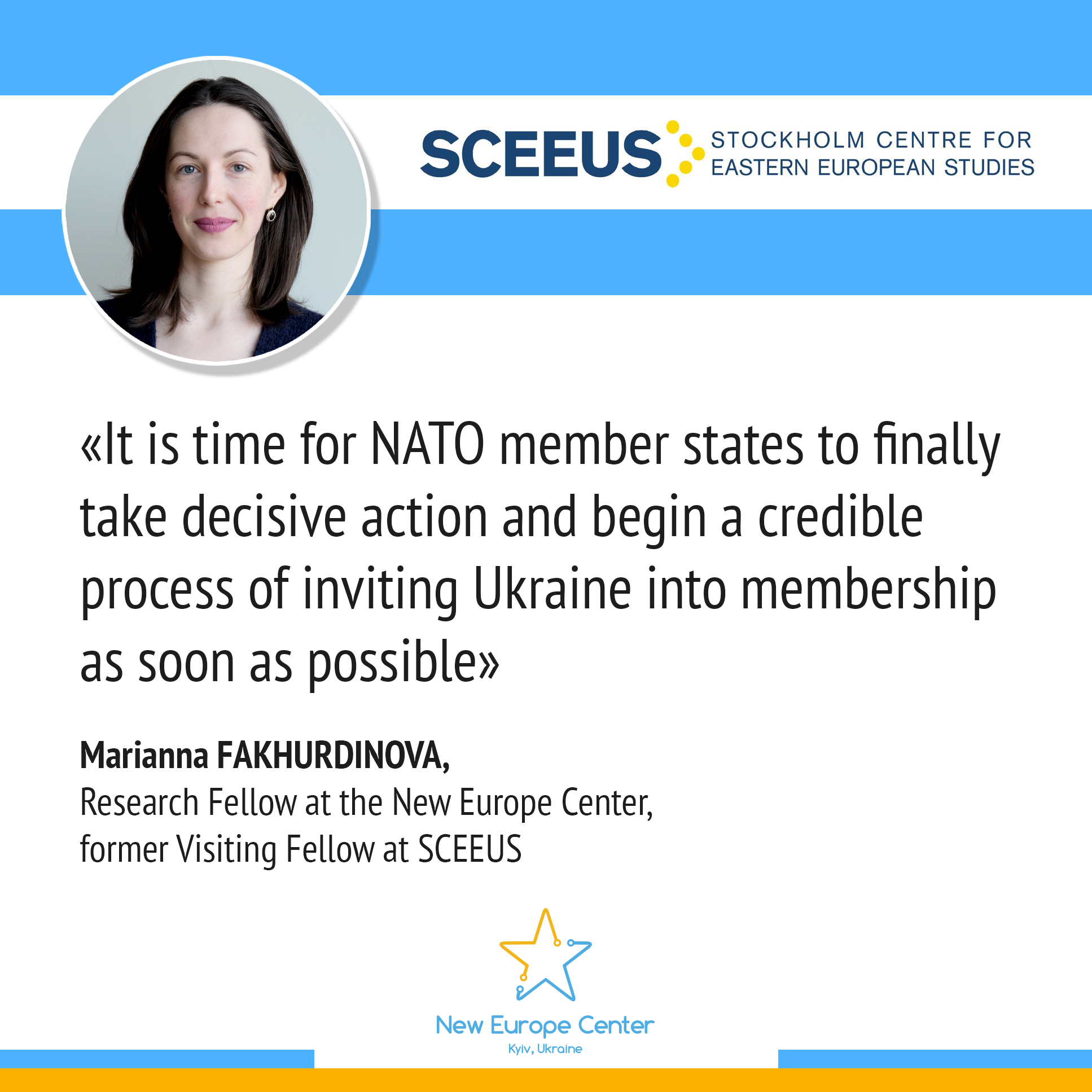
Opponents of Ukraine’s membership in NATO often appeal to the fact that our country is not yet technically ready for such a step.
On the eve of the Vilnius NATO summit, Marianna Fakhurdinova, the Research Fellow of New Europe Center, prepared a report on the extent to which Ukraine and NATO are ready for a significant upgrade of bilateral relations.
The research showed that Ukraine is making better progress in implementing reforms and implementing NATO standards and practices than is often thought:
- Ukraine provided 282 NATO standards into national legislation – 25% of the existing NATO standards;
- Mass deliveries of Western weapons to Ukraine lead to a more human-centric approach in the Ukrainian army, change the tactics of fighting and the philosophy of using weapons;
- Since the start of the full-scale invasion, 10,000 Ukrainian servicemen have been trained under the UK-led INTERFLEX operation (as of February 2023), over 16,000 as part of the EU MAM (as of April 2023), and 11,000 in the US as part of joint military maneuvers and staff exercises (as of June 2023);
- Despite the Big War, Ukraine continues to implement reforms in defense procurement and democratic oversight of the armed forces.
The argument about Ukraine’s technical unpreparedness is partly used to veil the main geopolitical reason – fear of Russia. In the third chapter of the study, the analyst debunks some key reservations of skeptics about inviting Ukraine to membership, such as:
- Such a move will further provoke Russia;
- A country at war cannot join the Alliance;
- Societies in NATO member countries do not support Ukraine’s accession;
- Ukraine should focus on integration into the EU, which also includes a security component;
- Inviting Ukraine to membership will contribute to instability and unleash the III World War.
The analysis is available on the website of the Swedish analytical center SCEEUS (Utrikespolitiska Institutet) – bit.ly/3D3LobJ
On the outside looking in: Why NATO should invite Ukraine to join the Alliance at the Vilnius summit
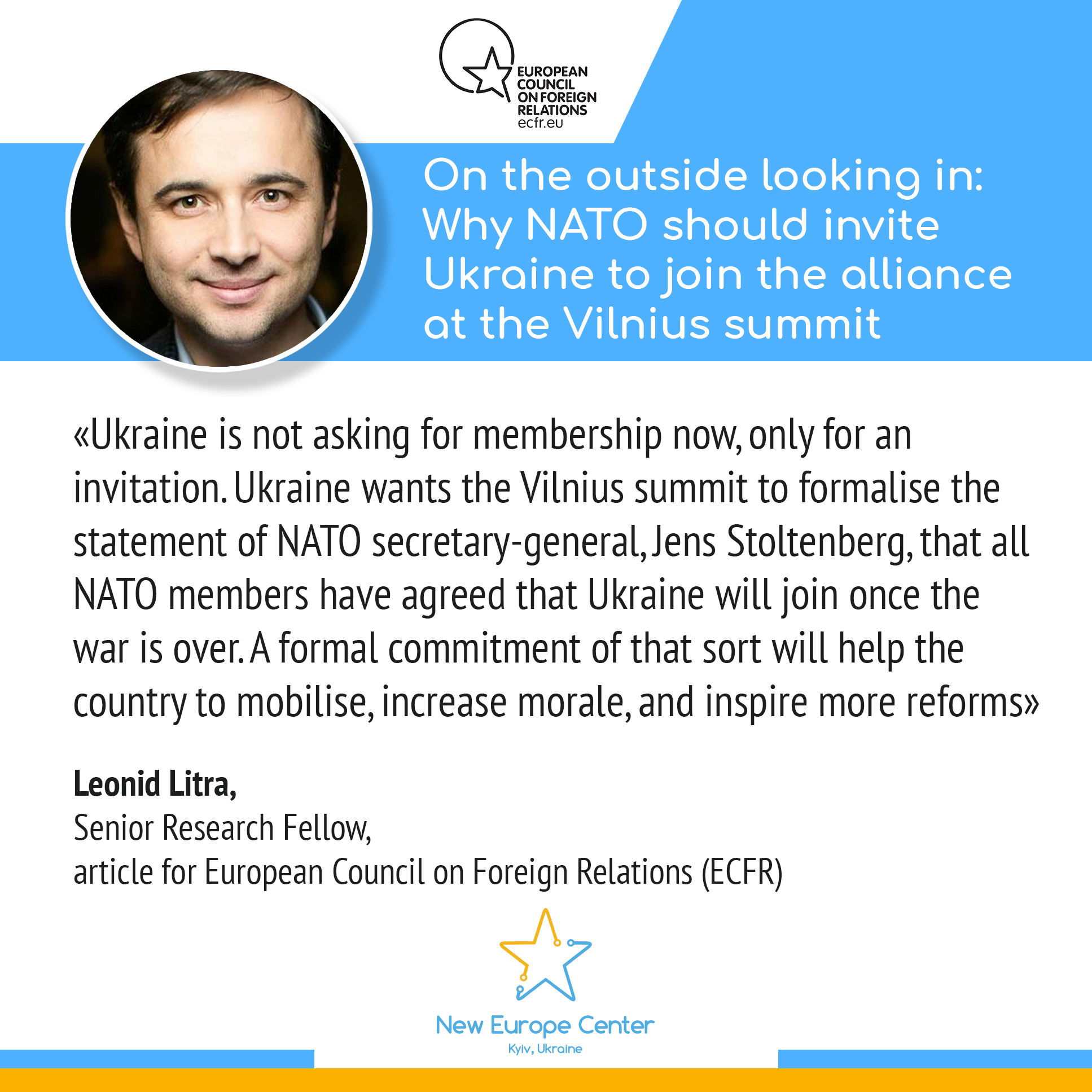
Leonid Litra, Senior Research Fellow, in his article for European Council on Foreign Relations (ECFR) explained in details why NATO should invite Ukraine to join the alliance at NATO Summit in Vilnius.
Expectations for Vilnius
- The summit currently seems set to offer Ukraine a package of incentives short of a membership invitation. This package would include the creation of a NATO-Ukraine council, guarantees of military and financial support (not to be confused with security guarantees), and a statement about future membership that will take advantage of “constructive ambiguity”.
- NATO’s reticence has inspired Ukraine to fight for what it was promised at Bucharest.
- The key point for NATO leaders to understand is that Ukraine will only become a member after the war, so there is no question of applying NATO’s Article 5 to the current situation.
The risks of not inviting Ukraine to join NATO
- Without an invitation to join NATO, the Ukrainian government will lack the incentive to purse various important reforms, including promoting democratic civilian control over the military.
- Concerns about whether Russia might escalate the war if a NATO invitation need to take into the account the possibility that Russia will escalate if Ukraine is denied an invitation.
- The countries opposing Ukraine’s invitation are also worried that such a step might spark divisions within the alliance. But NATO unity would likely suffer more if the alliance decides to postpone an invitation.
- Most importantly, the reluctance to extend an invitation is causing concern in Ukraine that its Western partners consider Ukraine’s membership a bargaining chip in possible future negotiations between the West and Russia. Such a decision would grossly ignore Ukraine’s position and the policy of “nothing about Ukraine without Ukraine”.
More details: https://bit.ly/46JOfEG
Ukraine: invitation to NATO membership and state of reforms
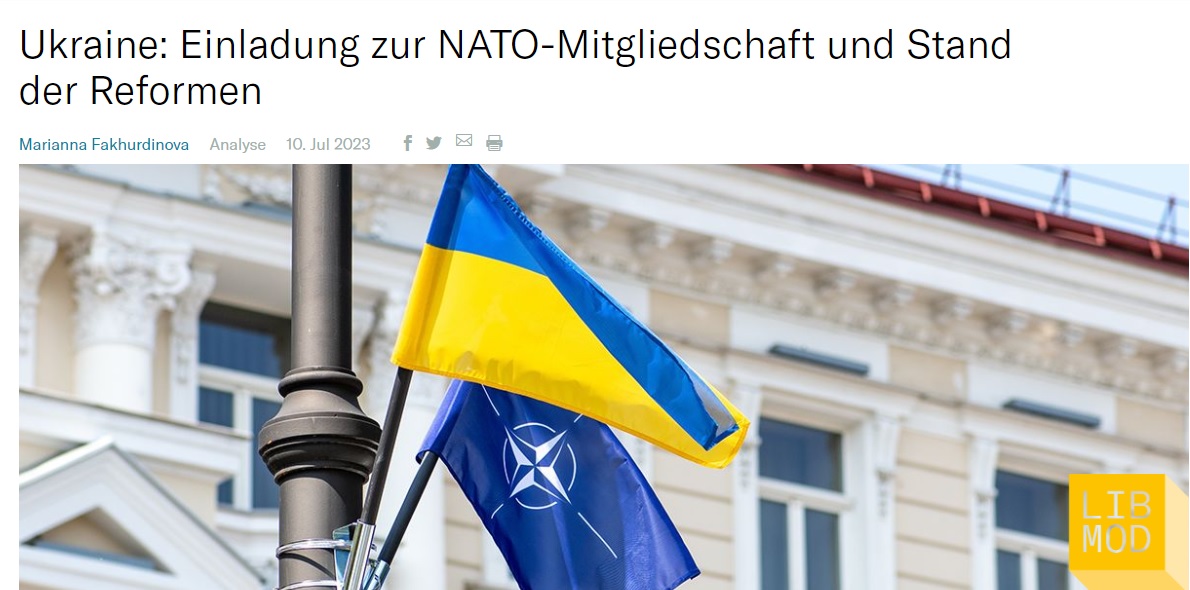
Ukraine’s invitation to NATO should not be postponed until “after the war”, but should be made at the summit in Vilnius. Marianna Fakhurdinova analyzes the state of reforms necessary for joining the Alliance on the Ukraine verstehen platform made by analytical center LibMod (Zentrum Liberale Moderne).
The material is in German: https://tinyurl.com/bdyyw427
Ukraine and NATO: how to correct the “Bucharest error” at the Vilnius summit
![]()
“The most effective, credible and least expensive way to ensure Ukraine’s long-term security is to join NATO by means of an invitation – even conditional – formalized from the next NATO summit in Vilnius”.
Alyona Getmanchuk in her analysis for LeRubicon appeals to France to show even more leadership in the issue of inviting Ukraine to NATO.
More details: https://bit.ly/3NXHtDF
Ukraine adopts NATO standards despite the Big War
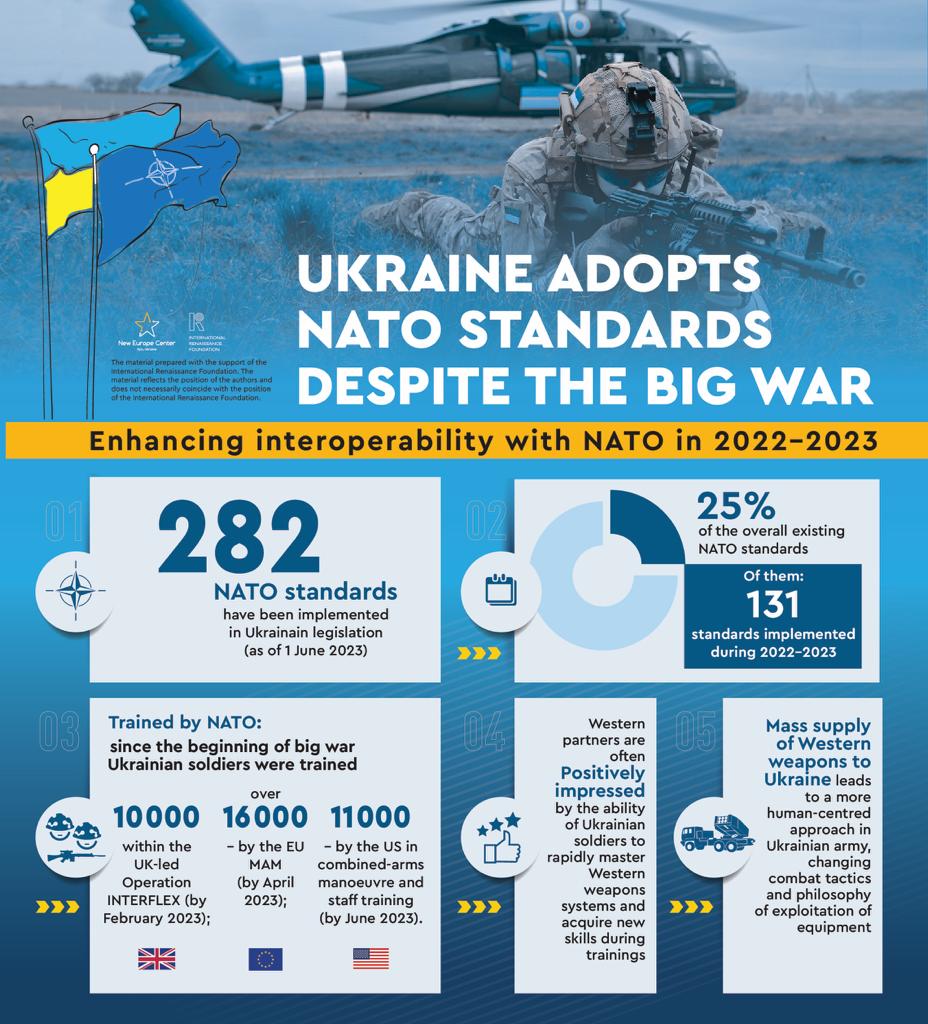
Enhancing interoperability with NATO in 2022-2023
- 282 NATO standards have been implemented in Ukrainain legislation (as of 1 June 2023);
- 25% of the overall existing NATO standards;
- Of them: 131 standards implemented during 2022-2023;
- Trained by NATO: since the beginning of big war 10 000 Ukrainian soldiers were trained within the UK-led Operation INTERFLEX (by February 2023), over 16 000 – by the EU MAM (by April 2023), 11 000 – by the US in combined-arms manoeuvre and staff training (by June 2023);
- Western partners are often positively impressed by the ability of Ukrainian soldiers to rapidly master Western weapons systems and acquire new skills during trainings;
- Mass supply of Western weapons to Ukraine leads to a more human-centred approach in Ukrainian army, changing combat tactics and philosophy of exploitation of equipment.
Accession process in NATO
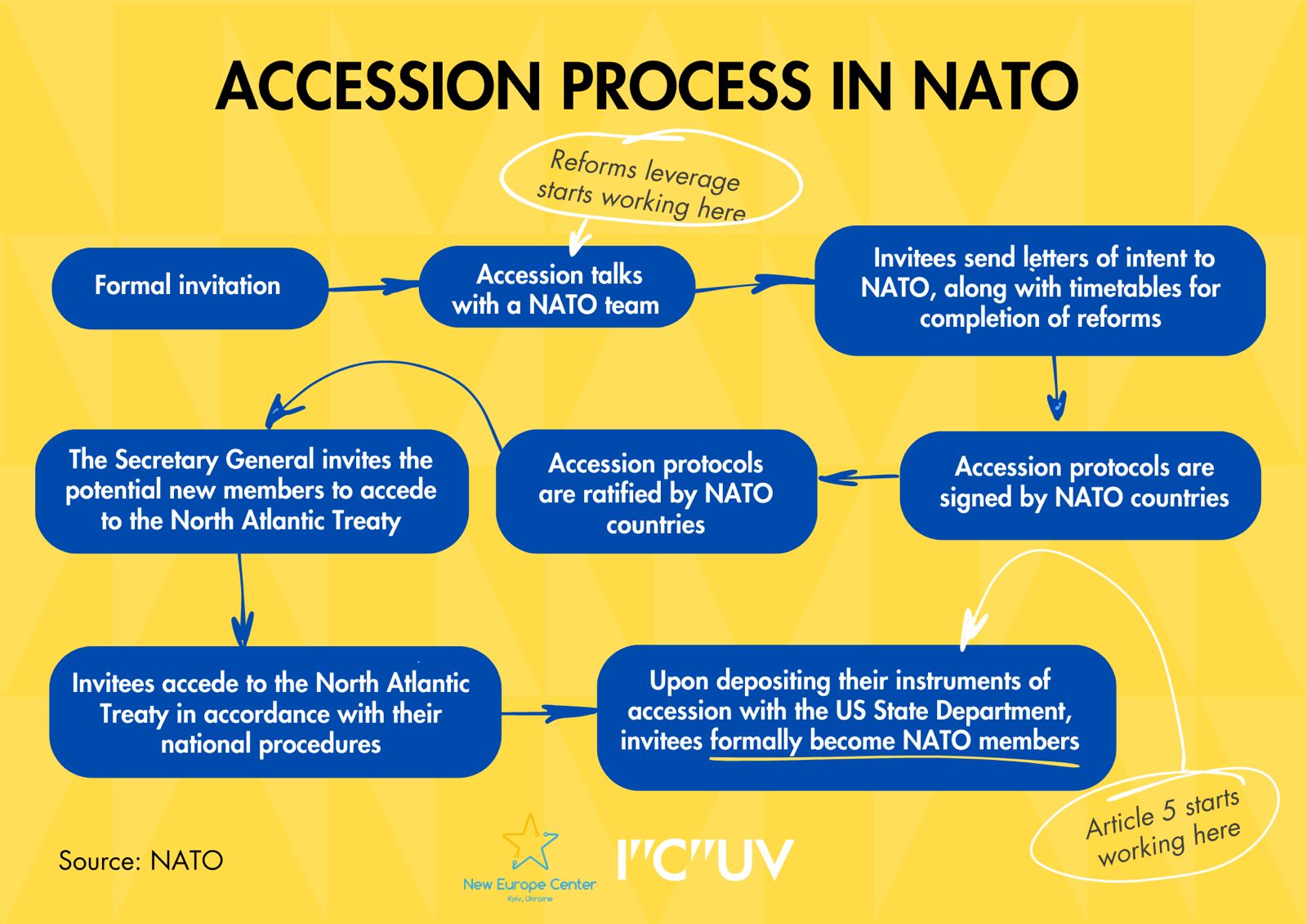
Many also that inviting Ukraine to join the Alliance at the Vilnius Summit would mean NATO soldiers marching into Ukraine to fight the Russian army early next morning. But it’s enough to simply take a look at the official NATO accession procedure to understand that’s absolutely not the case.
New Europe Center and ICUV – International Center for Ukrainian Victory developed infographic about NATO accession procedure.












